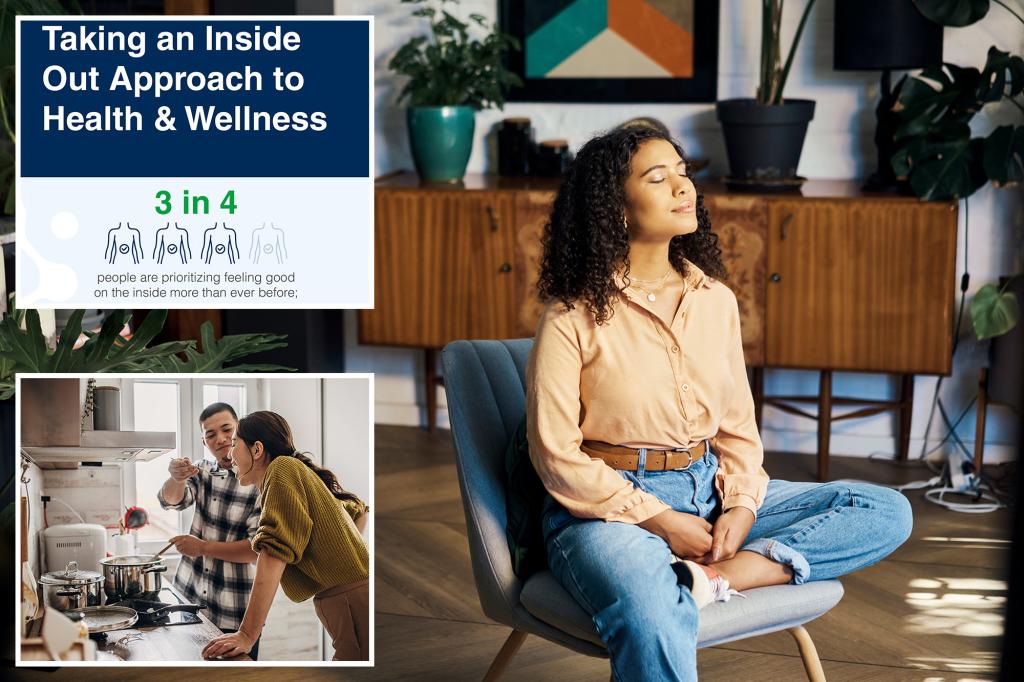Three in four people are prioritizing feeling good on the inside more than ever before.
That’s according to a new survey of 2,000 people, which explored the health approaches and habits that really make the difference.
The survey found that 77% of respondents now prioritize what feels good over what makes them look good.
And 30% of individuals reported they’ve adopted a more mindful health approach in 2025, which is a result of their increased awareness of bodily cues, mental processes and emotional responses.
The survey conducted by Talker Research on behalf of Metagenics found more than a quarter of respondents started taking their inner health seriously in the past year.
When it comes to inner health, for many, gut health isn’t just about digestion but also about listening to their bodies better, while connecting how they feel with what they notice outwardly.
As a result, people are stacking small, intentional habits that feel good and build long-term wellness. The most popular include prioritizing sleep (50%), eating nourishing meals (49%) and moving their bodies in ways that feel good (44%).
Other healthy acts respondents are embracing are saying “no” to things that are draining (38%), connecting with friends or loved ones in person (38%) and spending more time in nature (36%).
On average, respondents report doing five of these “feel-good” acts daily, while many are enhancing their feel-good factor by learning more about what their body needs in order to improve their wellbeing inside and out.
In fact, 77% of respondents believe their gut health directly affects how they feel emotionally, and nearly nine in 10 (86%) agree their emotional and physical health are deeply connected.
“These habits aren’t just routine, they’re intentional,” said Gulam Khan, vice president of marketing, North America at Metagenics. “We’re seeing more people take ownership of their health and well-being by investing in daily actions and routines that support how they want to feel physically, mentally and emotionally.”
Along their wellness journey, many have also actively given up habits they know don’t serve them or contribute to feeling worse in the long run. Mindless snacking while watching TV (28%), staying up late for no reason (27%) and eating ultra-processed foods (26%) were some of the most common habits people said they’d like to quit doing.
And when people aren’t feeling like their best selves, they’re taking softer, more restorative approaches. Nearly half (45%) of respondents say they take a nap or lie down, while others listen to music (30%), go for a walk (29%) or take a moment alone (24%).
Forty-two percent of all respondents said they’ve discovered a healthy habit that surprised them with how effective it was.
And, as more people learn to trust their gut, they’re researching things to help them along the way. More than half (53%) were confident they could explain how gut health affects the rest of the body without needing to look it up.
That may be why 31% of respondents report regularly taking a probiotic or supplement to support internal health, and why 57% of those who don’t, said they are open to considering it.
Among those already using gut-supporting supplements, the benefits are tangible. Forty-three percent of these respondents said their digestion has improved and 36% feel less bloated.
Some also reported more surprising benefits. Thirty-one percent are sleeping better, nearly one in three report more energy throughout the day and 27% are in a better mood because of a gut supplement.
“Ultimately, people are redefining what health means in 2025,” said Khan. “It’s no longer about chasing perfection, but about genuinely feeling better for today and into the future. Whether it’s setting boundaries, taking a walk or supporting your gut with a probiotic, people are realizing that lasting wellness starts from the inside out.”
TOP 10 DAILY WELLNESS ACTS
1. Prioritizing sleep (50%)
2. Cooking or eating meals that nourish me (49%)
3. Moving my body in a way that feels good (e.g., stretching, walking, dancing) (44%)
4. Saying no to things that drain me (38%)
5. Connecting with friends or loved ones in person (38%)
6. Spending time in nature (35%)
7. Taking breaks from screens and social media (32%)
8. Taking a daily probiotic or supplement (31%)
9. Prioritizing gut health (28%)
10. Practicing mindfulness (e.g., meditation, breathwork) (22%)
Survey methodology:
Talker Research surveyed 2,000 Americans; the survey was commissioned by Metagenics and administered and conducted online by Talker Research between June 17 – June 23, 2025.
Read the full article here

